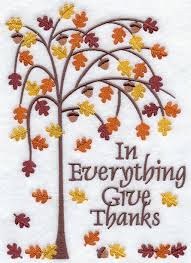1 Thessalonians 5: 12-24
Norman B. Bendroth
Thanksgiving Sunday 2015
12 But we appeal to you, brothers and sisters, to respect those who labor among you, and have charge of you in the Lord and admonish you; 13 esteem them very highly in love because of their work. Be at peace among yourselves. 14 And we urge you, beloved, to admonish the idlers, encourage the fainthearted, help the weak, be patient with all of them. 15 See that none of you repays evil for evil, but always seek to do good to one another and to all. 16 Rejoice always, 17 pray without ceasing, 18 give thanks in all circumstances; for this is the will of God in Christ Jesus for you. 19 Do not quench the Spirit. 20 Do not despise the words of prophets, 21 but test everything; hold fast to what is good; 22 abstain from every form of evil.
23 May the God of peace himself sanctify you entirely; and may your spirit and soul and body be kept sound and blameless at the coming of our Lord Jesus Christ. 24 The one who calls you is faithful, and he will do this.
 St. Ignatius observed, “The root of all sin is ingratitude.” That’s a sweeping statement, but I think it’s essentially sound. No one is born thankful. It is a learned habit like all other virtues. When we take our children trick-or-treating after they get their treat how often do we say, “Remember to say thank you.” Often we associate gratitude with having enough stuff. We’re grateful for a comfortable home, friends who know everything about us and still love us, our 4K TVs with surround sound, and enough money for a vacation to Barbados once in a while. And that is as it should be. But is there a direct correlation between having enough stuff and gratitude? If that were the case people with the most stuff should be the most grateful. People with not much stuff would be sullen and resentful.
St. Ignatius observed, “The root of all sin is ingratitude.” That’s a sweeping statement, but I think it’s essentially sound. No one is born thankful. It is a learned habit like all other virtues. When we take our children trick-or-treating after they get their treat how often do we say, “Remember to say thank you.” Often we associate gratitude with having enough stuff. We’re grateful for a comfortable home, friends who know everything about us and still love us, our 4K TVs with surround sound, and enough money for a vacation to Barbados once in a while. And that is as it should be. But is there a direct correlation between having enough stuff and gratitude? If that were the case people with the most stuff should be the most grateful. People with not much stuff would be sullen and resentful.
But that is rarely true, is it? The Chronicle of Philanthropy latest findings are that the wealthiest Americans are giving a smaller share of their income to charity (2.1%) than they once did, while poor and middle-income people are donating a larger share. (4.3). Studies also show there is more contentment and happiness among tribal peoples than in the developed West. Maybe they’ve learned that happiness isn’t dependent upon stuff.
In fact, the irony is that often the more we have the less thankful we are. We live in an age with an extraordinary sense of entitlement. You know the old saw, “I pulled myself up by my own boot straps and bull dog determinism. I am where I am because I’ve earned it all.” Really? To say that means that you birthed yourself, changed yourself, taught yourself to walk, educated yourself, constructed all the roads, and created all the benefits you enjoy from society by yourself. There was once a man who boasted whenever he could that he was a self-made man until an exasperated friend finally declared, “Well, that relieves the Lord of a terrific responsibility, doesn’t it?”
An attitude of entitlement or being a self-made person deprives God of thanks. True gratitude begins with humility recognizing that we did not create ourselves and that everything we have and are is a gift. The ungrateful person forgets the inter-dependence of the uni¬verse and that ultimately God is the first cause and the prime mover. The universe didn’t suddenly burp and we were here. It was created and is superintended by our loving God and we live under God’s reign. The word gift is charis which is the same word for grace in the Greek. The gifts we have are all of God’s grace, undeserved and unearned. The Latin root for gratitude is gratis which means free. That’s why we give thanks because it’s free, it’s a gift.
In one episode of the Simpsons, when Bart is asked to give thanks at a family meal, he says, “Dear God, we bought all of this stuff with our own money, so thanks for nothing.” Bart’s prayer echoes the sentiment of our age. Often, the more we have the more likely we are to say, “Thanks for nothing.” When you think about it, who is tempted to claim that he or she is a self-made-man or a self-made-woman? Is it the person who has little of this world’s goods and have enjoyed little earthly success or the person who has been given much and owns much?
In our Epistle lesson today, Paul directs us to “Be joyful always; pray continually; give thanks in all circumstances, for this is God’s will for you in Christ Jesus.” What’s with this guy? Does he live in la-la land? In every¬thing give thanks? Is this ivory tower theology? Do we thank God for car accidents, stale marriages, tedious jobs, sleepless nights, final exams, terrorism in Paris, Kenya, Beirut, and Egypt, violent streets, and cancer? No. Nein. Nix. Ne pas. Negenato. Non!
There is a popular heresy that sometimes runs in Christian circles that we should praise God for the evil or misfortune that buffets. “God is testing me” or “God is teaching me,” is said almost glibly. I’ve also heard people say, particularly to those who are grieving, “This is part of God’s plan” and “There is a reason for everything.” I know they mean well and are struggling to find helpful words, but to tell hurting, sick or grieving people that “there is a reason for everything” or that “this is part of God’s plan” implies that God did this to them. To tell Syrian refugees this is to say that God condones violence, kills children and endorses ISIS. Scandalous ideas!
Can God bring good out of evil? Yes. Absolutely. But that is a very different thing than saying that God causes evil to happen. Yes, God does use circumstances to grow us and stretch us, if we are open to it. But that’s quite different from saying God deliberately puts banana peels in our pathway. “God cannot be tempted by evil,” says James, “nor does God tempt anyone.”
 What this passage calls us to do is to thank God in spite of our circum-stances. I think Paul is helping us answer the question, “How do we learn to be more thankful?” By doing it. Paul commands us to give thanks in all circumstances. We need to get in the habit of doing it even when we don’t feel like it. We thank God that we don’t have to go it alone–that the Holy Spirit and supportive friends and family walk with us. We thank God for the spiritual resources we have been given to cope with the circumstances. We thank God for this community of faith that carries the pain with us. We can face the Living God and say, “God, I don’t understand why this is happening, but by faith I thank you that you are still God. You are Sovereign and you hold not only my life, but this entire planet. You are the powerful God. You are the wise God. You are the patient God. You are the joyful God. Give me your power, wisdom, patience, and joy. I affirm that you have set your love on me and walk with me through this valley of the shadow and supply the strength I need to deal with it.”
What this passage calls us to do is to thank God in spite of our circum-stances. I think Paul is helping us answer the question, “How do we learn to be more thankful?” By doing it. Paul commands us to give thanks in all circumstances. We need to get in the habit of doing it even when we don’t feel like it. We thank God that we don’t have to go it alone–that the Holy Spirit and supportive friends and family walk with us. We thank God for the spiritual resources we have been given to cope with the circumstances. We thank God for this community of faith that carries the pain with us. We can face the Living God and say, “God, I don’t understand why this is happening, but by faith I thank you that you are still God. You are Sovereign and you hold not only my life, but this entire planet. You are the powerful God. You are the wise God. You are the patient God. You are the joyful God. Give me your power, wisdom, patience, and joy. I affirm that you have set your love on me and walk with me through this valley of the shadow and supply the strength I need to deal with it.”
That is why we can be thankful. When one stops and recognizes that God is with us in all the circumstances of life, it gives us great liberty and joy. When we face the sun, the shadows fall behind us and we don’t see them. But when we turn our backs on the sun all we can see are the shadows. What a wonderful freedom it is to be able to rise above our circumstances and say, “This annoyance does not have to reign in my life. I have a choice. I can let Christ reign over it.” “I do not have to let that person who just cut me off or hurt me or treated me unfairly be in power over my emotions, for the power of Christ reigns in me.” We will be able to experience Jesus’ promise, “In the world you will have tribulation, but fear not, for I have overcome the world.”
Remember, this passage was written by one who had experienced beatings, tortures, stoning, shipwreck, and all manner of rejection. And it was written to the Thessalonians who were constantly slandered by their Jewish opponents, persecuted by the pagan members of the city, and pressured to revert to the easy-going sexual standards of fertility cults. They also had conflicts within the church. There were folks who wouldn’t work because they figured Jesus was coming back soon and would transform society, so they sponged off of everyone else. There were doctrinal problems and personality conflicts. And to these people Paul says with confidence, “In everything give thanks.”
 So, what is the cure for an ungrateful heart? First, recall and remember. Remember all that God has done for you in 2015 and remember all that God promises for the future. In recent years I have kept a gratitude journal. Every day I try to write down three things for which I’m grateful. I even write down things that drive me nuts and reframe them into a statement of gratitude. “I am so mad that my daughter’s puppy just peed on the rug again, but I’m grateful for my animal companions and that we have made a home for an abandoned creature.” Upon accepting an award, the late Jack Benny once re¬marked, “I really don’t deserve this. But I have arthritis, and I don’t deserve that either.” There are a lot of things we get in life that we don’t deserve–and a lot of them are good things.
So, what is the cure for an ungrateful heart? First, recall and remember. Remember all that God has done for you in 2015 and remember all that God promises for the future. In recent years I have kept a gratitude journal. Every day I try to write down three things for which I’m grateful. I even write down things that drive me nuts and reframe them into a statement of gratitude. “I am so mad that my daughter’s puppy just peed on the rug again, but I’m grateful for my animal companions and that we have made a home for an abandoned creature.” Upon accepting an award, the late Jack Benny once re¬marked, “I really don’t deserve this. But I have arthritis, and I don’t deserve that either.” There are a lot of things we get in life that we don’t deserve–and a lot of them are good things.
Second, give it away. Demonstrate your gratitude by sharing your blessings with others. Today is not only Thanksgiving Sunday but also Stewardship Sunday. One of the finest motivations I can think of for giving is gratitude. We are blessed to be a blessing. We give to others because we have been given so much. As I wrote in the FLASH and Faith Notes this week, Jesus said, “Where your treasure is, there your heart will be also.” We like to reverse it to say, “Where your heart is, there your treasure will be also.” And that would make sense. We give to the things we care about. But that’s not what Jesus said. That’s the appeal we get from public radio. “If you enjoy the music and programming you listen to here, then do your part.”
But Jesus is giving us a different equation. In a recent Christian Century article Martin Copenhaver suggest that we give and spend where you want your heart to be, then let your heart catch up. Ask yourself, “If I were the sort of person I truly want to be, then what would I do? How would I spend my money?” Then do what you would do if you were that kind of person. Put your treasure where you want your heart to be. Put your money where your mouth is. If you do, Jesus says, your heart will follow along like a puppy on a leash. If you want to care more about the kind of car you drive then go out and buy a high end BMW. But if you want your faith and trust in God to grow, make a pledge to the church that makes a difference.
This is Jesus’ style isn’t it? He doesn’t say feel benevolent toward your enemies. He commands us to love our enemies and pray for those who persecute us. He asks us to act. Turn the other cheek. Settle differences quickly. Don’t worry. Give thanks to God. It’s like the Nike ads borrowed their motto from Jesus: “Just do it!”
Third, and last, practice gratitude. Not only did Paul tell us “in everything give thanks,” but so do the Psalms “O give thanks to the Lord, for he is good, for his steadfast love endures forever. O give thanks to the God of gods, for his steadfast love endures forever” (Psalm 136: 1-2). The Psalmist doesn’t tell us to be thankful but to offer thanks. Bless God. You may not feel like doing it, but do it anyway. There is a practice from the Jewish tradition that is helpful here. Whenever something marvelous happens to you, when you see a radiant orange leafed tree, when you feel a newborn baby’s soft cheek, after a good meal say, “Blessed be Thou.” Blessed be Thou O wonder and mystery of the universe for my humanity, my senses, the beauty that surrounds, the love of Christ that lives in me.
Gratitude is learned behavior. While circumstances certainly have a profound effect on our lives, by the power of the Spirit, we can choose whether to be bitter or accepting, anxious or peaceful, kind or spiteful, envious or grateful. Over time, like anything, the more we practice gratitude it will become as natural as breathing.
C.S. Lewis observed in his book God in the Dock that grateful people are emotionally healthy people. “Praise,” said “almost seems to be inner health made audible.” I would say that words of thanksgiving are also inner health made audible.
